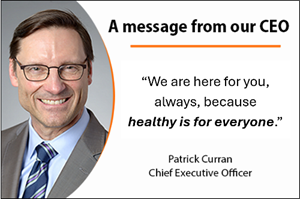Opioids are a class of medications that can be prescribed to treat pain. The longer opioids are used, the higher risks can get. If you take or plan to take opioids for more than three months, it is important to know the possible risks. We want to make sure you have the information to keep yourself safe.
Risks Of Long-Term Opioid Use*
MISUSE AND ADDICTION As many as one in four people who take opioids long-term struggle with misuse or addiction. Over time, opioids may not lower your pain, making you think you need a higher dose.
MORE PAIN If opioids are taken daily, they may worsen pain or cause pain in other parts of your body that did not have pain before. There is not enough data to prove that long-term opioid use reduces pain.
HEALTH DIFFICULTIES Like:
- Abdominal pain
- Constipation
- Heart problems
- Breathing problems
- Depression
- Hormone changes
- Confusion
- Falls and fractures
- Overdose or death
Opioids include:
- Hydrocodone
- Oxycodone
- Morphine
- Tramadol
- Methadone
- Fentanyl
- Codeine
Reduce the Risks That Come with Long-Term Opioid Use
Talk to your provider about:
- Increased risk of overdose while taking other medications with opioids (like benzodiazepines used to treat insomnia or anxiety).
- How cutting back or stopping the use of opioids can be a healthy choice for you.
- Other types of pain care that may work better and be safer than opioids, like:
SELF CARE ACTIVITIES YOU CAN DO ON YOUR OWN:
- Physical therapy
- Exercise
- Quitting tobacco
- Talk therapy
- Acupuncture
NON-OPIOID MEDICATIONS:
- Acetaminophen
- Non-steroidal anti-inflammatory medicines or NSAIDs (like ibuprofen, naproxen or diclofenac)
- Anticonvulsants (like gabapentin or pregabalin)
- Antidepressants (like amitriptyline or duloxetine)
- Topical products (like lidocaine 4% patches)
Visit www.hpsm.org/pain-management to learn more about managing chronic pain.
* Dowell D, Ragan KR, Jones CM, Baldwin GT, Chou R. CDC Clinical Practice Guideline for Prescribing Opioids for Pain — United States, 2022. MMWR Recomm Rep 2022;71(No. RR-3):1–95. DOI: http://dx.doi.org/10.15585/mmwr.rr7103a1.



